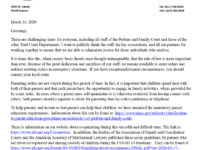Co-parenting, even when not in the midst of a global pandemic, can be challenging. Add in the stress of the unprecedented circumstances our world is currently facing due to COVID-19, and it can become infinitely more difficult.
During these complicated and uncertain times, Chief Justice Casey of the Massachusetts Probate and Family Courts has issued an open letter reminding parents of how important it is to encourage interaction with each parent and providing opportunities for the other parent to engage in family activities, when possible. Chief Justice Casey's open letter can be found here, and is also contained in the included image.
The court remains committed to be available to enter and enforce orders in emergency situations.
For more information about co-parenting during this stressful time, Judge Casey recommends visiting https://www.afccnet.org/Coronavirus. The Association of Family and Conciliation Courts has published seven guidelines for parents who are divorce or separated and working through sharing custody of children during the COVID-19 pandemic. They can be found at https://www.afccnet.org/Portals/0/COVID19Guidelinesfordivorcedparents.FINAL.pdf?ver=2020-03-17- 202849-133.
To speak with a lawyer about divorce or MA alimony matter, contact Mavrides Law in Boston or Wellesley, MA. To schedule an in-depth initial consultation, call 617-723-9900 or contact the firm at info@mavrideslaw.com
All content provided on this blog is for informational purposes only. You should not act upon any such information without first seeking qualified professional counsel on your specific matter. Mavrides Law makes no representations as to the accuracy or completeness of any information on this site. Mavrides Law will not be liable for any errors or omissions in this information nor for the availability of this information. These terms and conditions of use are subject to change at any time and without notice. Communication of information by, in, to or through this Website and your receipt or use of it (1) is not provided in the course of and does not create or constitute an attorney-client relationship, (2) is not intended as a solicitation, (3) is not intended to convey or constitute legal advice, and (4) is not a substitute for obtaining legal advice from a qualified attorney.





